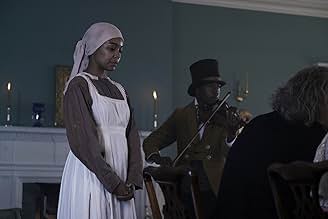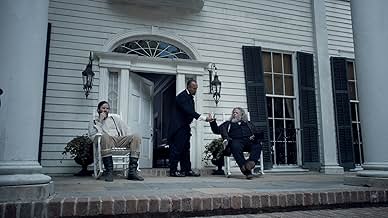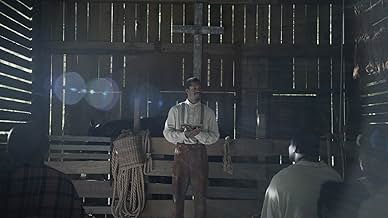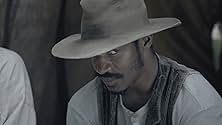Nat Turner, un esclavo alfabetizado y predicador del sur estadounidense de antes de la guerra, orquesta un alzamiento.Nat Turner, un esclavo alfabetizado y predicador del sur estadounidense de antes de la guerra, orquesta un alzamiento.Nat Turner, un esclavo alfabetizado y predicador del sur estadounidense de antes de la guerra, orquesta un alzamiento.
- Dirección
- Guionistas
- Elenco
- Premios
- 5 premios ganados y 32 nominaciones en total
- Reverend Walthall
- (as Mark Boone Jr.)
- Nancy
- (as Aunjanue Ellis)
Opiniones destacadas
Also, I don't know what this other critic user is talking about in regards to calling this movie, "racist crap" and giving it a 1 out of 10. The movie tells the story of a rebellious slave who does whatever he needs to, to achieve freedom from the oppressive south. With that being said, his story simply tells the truth of our nations racial relations at this time. In this particular context, Blacks and whites surely were not singing kumbaya, our relationship was highly one-sided, volatile, and largely disturbing. So, to anyone who is not prepared to see a small glimpse of historical truth in regards to our nations past, do not see this movie. You'll just end up like this other user, offended because this movie doesn't depict white people as saviors, heroes, etc, like most movies...it depicts a more sinister side that too often goes untold, unseen, and therefore, unnoticed.
This is competently made. It is sincere but it doesn't have that extra something to put it over the top. Nate Parker is a good actor but Nat Turner is a passive character for the first half of the movie. He could have made more with the religious aspect. That would be a different angle to get at this subject matter. Whatever it is, the movie needs a new spin to angle this shot.
The antebellum South had not been kind to slaves, if you look only at the award-winning 12 Years a Slave, in which Solomon Northrup, an upstate New York free man, was sold into slavery. But you can now relive that excruciating experience from the religious and moral perspective of a slave, Nat Turner (Nate Parker), in Nate Parker's realistic and dramatic The Birth of a Nation.
While both men are mercilessly whipped in the two films, 12 Years remains superior in its scope and complexity. Yet, Birth is strong in deeply exploring the hero's motivations for the rebellion he eventually foments in 1831. It shows his daily humiliations and hardening in the face of unfettered violence, his growing reliance on the Bible for rebellion, and finally the brutal rape of his wife, Cherry (Aja Naomi King). The film graphically depicts the violence and is equally indulgent showing the growing love between Nate and her.
As in 12 Years, Birth takes care to show the close relationship between slave and master, Samuel (Armie Hammer). In both cases, master might seem at times benign but not over the length of the film. The owner becomes a symbol of the once proud South now reduced to exploiting human beings, in this case black slaves. In Birth, the progression to violence is slow, even as the ultimate violence comes on us.
Parker has a director's eye for the ironies inherent in the beautiful Virginia mansion (actually filmed in Savannah) and the poverty of the servants' quarters, the empathy of Samuel's mother, Elizabeth (Penelope Ann Miller), and the growing intolerance of her son. Thank Geoffrey Kirkland's production design— white plantation houses and those iconic drooping willows—to a stirring, sometimes too intrusive, score by Henry Jackson. Elliot Davis's camera is particularly strong in night shots. Director Parker's slow pullback shot of the mass hanging is memorable.
Although this film does not have the epic perspective of its namesake by D. W. Griffith (1915), it is nonetheless a respectable entry into the canon of film helping to reconcile the white and black populace, the birth of tolerance.
¿Sabías que…?
- TriviaThe film was shot in 27 days.
- ErroresThe accents used in the film are typical of the modern Deep South, not of early-19th-century Tidewater, Virginia.
- Citas
Nat Turner: [after Nat watches a horrific scene between a slave and slave owner and has to preach to the slaves] Brethren, I pray you'll sing to the Lord, a new song. Sing praise in assembly of the righteous. Let the saints be joyful in glory, let them sing aloud on their beds. Let the high praise of God be on the mouths of the saints and a two-edged sword in their hand to execute vengeance on the demonic nations! And punishment on those peoples! To bind their kings with chains, and their nobles with fens of iron! To execute on them this written judgement! This honor have all his saints! PRAISE THE LORD! PRAISE THE LORD! SING TO HIM A NEW SONG! PRAISE THE LORD! PRAISE THE LORD!
- ConexionesFeatured in Rise Up: The Legacy of Nat Turner (2016)
- Bandas sonorasCouldn't Hear Nobody Pray
Performed by the Wiley College Choir
SATB Arranger: Stephen Hayes (as Stephen L. Hayes)
Melody researched by Frederick D. Hall, Sr.
Selecciones populares
- How long is The Birth of a Nation?Con tecnología de Alexa
- Is this based on a true story?
Detalles
- Fecha de lanzamiento
- Países de origen
- Sitios oficiales
- Idioma
- También se conoce como
- Giải Phóng
- Locaciones de filmación
- Productoras
- Ver más créditos de la compañía en IMDbPro
Taquilla
- Presupuesto
- USD 8,500,000 (estimado)
- Total en EE. UU. y Canadá
- USD 15,861,566
- Fin de semana de estreno en EE. UU. y Canadá
- USD 7,004,254
- 9 oct 2016
- Total a nivel mundial
- USD 16,779,212
- Tiempo de ejecución2 horas
- Color
- Relación de aspecto
- 2.39 : 1
Contribuir a esta página










































